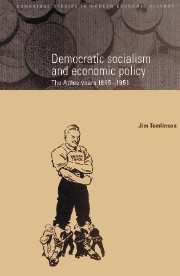Book contents
- Frontmatter
- Contents
- List of tables
- Acknowledgements
- List of abbreviations
- 1 Introduction: Labour and the economy 1900–1945
- 2 Labour and the international economy I: overall strategy
- 3 Labour and the international economy II: the balance of payments
- 4 Industrial modernisation
- 5 Nationalisation
- 6 Controls and planning
- 7 The financial system
- 8 Employment policy and the labour market
- 9 Labour and the woman worker
- 10 Towards a Keynesian policy?
- 11 The economics of the welfare state
- 12 Equality versus efficiency
- 13 Conclusions: political obstacles to economic reform
- Bibliography
- Index
2 - Labour and the international economy I: overall strategy
Published online by Cambridge University Press: 09 November 2009
- Frontmatter
- Contents
- List of tables
- Acknowledgements
- List of abbreviations
- 1 Introduction: Labour and the economy 1900–1945
- 2 Labour and the international economy I: overall strategy
- 3 Labour and the international economy II: the balance of payments
- 4 Industrial modernisation
- 5 Nationalisation
- 6 Controls and planning
- 7 The financial system
- 8 Employment policy and the labour market
- 9 Labour and the woman worker
- 10 Towards a Keynesian policy?
- 11 The economics of the welfare state
- 12 Equality versus efficiency
- 13 Conclusions: political obstacles to economic reform
- Bibliography
- Index
Summary
The domestic economic policies of the Attlee government can only be understood in the context of the international economic issues which the government faced, and the means by which it chose to try and resolve these. Those issues cannot be reduced simply to the immediate problem of balancing the international accounts, serious as that undoubtedly was (it is dealt with in detail in the next chapter). The government had also to deal with questions about the kind of trade and payments regime they wanted to see, a problem high on the agenda because of the very strong US commitment to a multilateral, nondiscriminatory trade regime and a ‘liberal’ exchange regime under the auspices of the IMF. This US commitment was one that plainly could not be ignored because of the dependence of the UK on financial resources from the USA in these years of chronic ‘dollar shortage’. Equally, the government had to deal with the question of the sterling area, which during the war had grown willy-nilly into a regional economic bloc, with Britain at the centre. Though not totally coterminous, the sterling area was in turn clearly linked with the empire, so policies on this issue were affected by broad considerations about the future of that empire. Finally, but not least, the existence of the sterling area raised questions about the role of sterling as an international currency, which again was not just a simple ‘economic’ issue but one with profound implications for Britain's actual or perceived role in the world.
- Type
- Chapter
- Information
- Democratic Socialism and Economic PolicyThe Attlee Years, 1945–1951, pp. 23 - 46Publisher: Cambridge University PressPrint publication year: 1996



